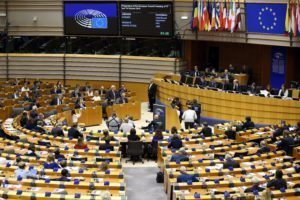One of the little recognised consequences of the Brexit deal currently before Parliament is that Northern Ireland could end up with a bigger say in Europe than the rest of the UK. That’s because its citizens may well have the option to petition The European Courts to have representation in the European Parliament through the continued election of MEPs.
 This would be on the basis of a legal principle enshrined in EU law as a result of a petition by a UK citizen living in another British dominion — Gibraltar.
This would be on the basis of a legal principle enshrined in EU law as a result of a petition by a UK citizen living in another British dominion — Gibraltar.
Back in 1994, Denise Matthews, a UK citizen then resident in Gibraltar, requested that she be allowed to vote in the EU elections that were coming up, this was denied as it was held that this right only applied to the UK. But in 1999 in Matthews v United Kingdom The European Court of Human Rights overturned the decision and (in what became known as the Matthews principle) it was held that any citizen being subject to a large degree of European law requires that that citizen has democratic representation i.e. the right to vote for an MEP in the European parliament.
Now fast forward to today. It’s clear that the same issue presents itself in Northern Ireland should the current agreement become law. Indeed, the precision and range of the applicable EU law governing Northern Ireland is of a much more tightly defined and exact nature than was the case in the agreement negotiated by Mrs May. In short, the EU exercises powers in the agreement over Northern Ireland in goods, services, capital and labour, employment, competition law, consumer protection and, in some respects, free movement (after all there is no hard border).
All this is over and above, for instance, Turkey’s relationship with the EU; and is in contradistinction to EEA countries like Norway. EEA members can, in principle, pull out of any single law they object too. In Northern Ireland there is the putative veto enacted by a simple majority to pull out of the entire agreement, but there is no ability to question singular laws at the time they are promulgated. So, there’d be no direct participation for the citizens in Northern Ireland in the laws to which they’d also be subject. One of the required conditions of the EU exercising powers over a non-voting territory is the notion of consent, but no such referendum for this exercise of European powers has been held in Northern Ireland nor has one been offered in the agreement.
One can easily imagine a concerned group of Northern Irish citizens petitioning the courts in exactly the same manner as Ms Matthews. It’s not at all clear why they would not, on the same principles as Gibraltar, win their right to European representation.
If they won the right of representation, how would it be exercised? Logic alone would suggest that the election of Northern Irish MEPs to the European Parliament would be the most appropriate channel. Political reality would incline in that direction as well — Unionists would not want to further strengthen the relationship with the Republic, still less would they want to give southern lawmakers control over the north. They would themselves offer unionist candidates for the European parliament, as of course would the other parties. So, in effect, it might be said that in Northern Ireland, as a result of the current agreement, there would be no Brexit at all.








Join the discussion
Join like minded readers that support our journalism by becoming a paid subscriber
To join the discussion in the comments, become a paid subscriber.
Join like minded readers that support our journalism, read unlimited articles and enjoy other subscriber-only benefits.
Subscribe